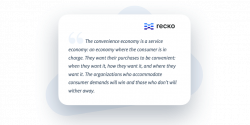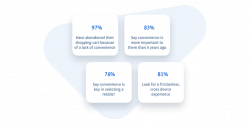Part one: An introduction to the Convenience Economy

A decade ago, customers would visit a brick-and-mortar store when a product was needed urgently, and would perhaps order online when they could wait for a couple of days. Now with the rise of new forms of commerce, such as eCommerce, marketplaces, and social commerce, the shopping experience has changed.
Unsurprisingly, customers now play by a different set of rules and expectations. It has provided them with a new mindset when it comes to shopping, especially in eCommerce. Today’s customers prioritize a convenient online shopping experience. They want retail services to fit their busy lifestyles and want to purchase products how, when, and where they want them.
Nowadays, brands that are going to succeed are the ones that make commerce as accessible and therefore as convenient as possible.
Nowadays, brands that are going to succeed, know how to navigate the « Convenience Economy ».

New Channels for Shopping
The number of touchpoints that customers have available for shopping is constantly growing. Over the past years, we have seen the rise of marketplaces such as Amazon and eBay, and more recently social shopping on Instagram, Facebook, and TikTok.
The increasing number of sales channels, and the easy accessibility through smartphones, have transformed customers that “go shopping” into customers that are “always shopping”.

Shoppers are Channel Blind
Even though there are many new channels, it does not mean that customers necessarily see all channels separately. Shoppers are as they say “channel blind”. They do not shop in a channel, they shop with a brand. For customers, it no longer matters whether they shop on a marketplace, in a webshop, or brick-and-mortar store. They expect the same experience in each channel. What they want is a unified experience, with no gaps or misalignments between the products, prices, and services in any channel, regardless of what route they take through them.
Convenience is Key
The developments mentioned above have provided customers with a new mindset when it comes to shopping. And this translates into interesting statistics:

An Omnichannel Strategy
Omnichannel is one of the most important strategies in the convenience economy nowadays.

As Easy as 123
Customers want the shopping experience to be as easy as possible. Therefore, retailers should try to think about how they can save customers time, and provide them with low-effort buying options. Make pricing the same in all channels, enable pick-up in-store, providing an easy check-out, etc. Improving convenience will result in customers coming back for more.
Consistency
Consistency is the secret ingredient to happy customers. They want to have the confidence that retailers deliver on their promises every time. Product and service offerings need to be the same across channels. Also, support needs to be consistent across online and offline touchpoints.
Relevance
Today’s customer expects real-time, highly personalized, and tailored interactions that are tailored to buying preferences and user behaviors. Data analysis can help to boost the personalized experience. It helps to specifically meet the individual needs of your customers in all sales channels.
How to Navigate and Succeed in the Convenience Economy?
With all these new developments, it is important for commerce businesses to live up to customer expectations. They need to make the shopping experience as convenient as possible. In the next blog articles, we will explore multiple operations that retailers need to think about when servicing customers in the convenience economy.
Continue Reading Part Two: Customer Expectations in the Convenience Economy
Retour au blog